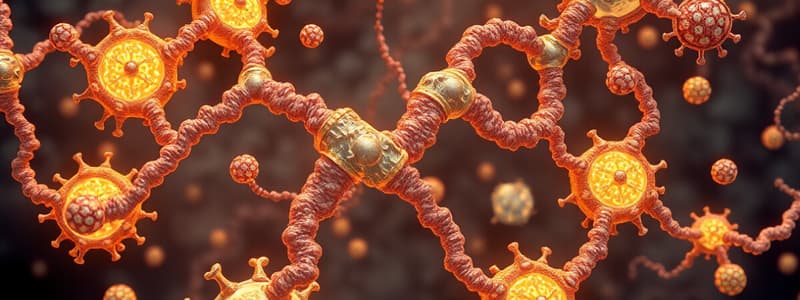Podcast
Questions and Answers
What happens to enzyme activity as temperature increases up to 40°C?
What happens to enzyme activity as temperature increases up to 40°C?
- It increases due to higher kinetic energy. (correct)
- It remains constant.
- It fluctuates without a clear trend.
- It decreases due to denaturation.
What is the optimum temperature for enzyme activity?
What is the optimum temperature for enzyme activity?
- 60°C
- 35-40°C (correct)
- 0°C
- 20°C
What effect does extreme pH have on enzymes?
What effect does extreme pH have on enzymes?
- It may denature some enzymes. (correct)
- It has no effect on enzymes.
- It increases enzyme activity.
- It stabilizes enzyme structure.
Which enzyme catalyzes the breakdown of stored starch during seed germination?
Which enzyme catalyzes the breakdown of stored starch during seed germination?
How does an enzyme's active site contribute to its function?
How does an enzyme's active site contribute to its function?
What role do enzymes play in biological washing powders?
What role do enzymes play in biological washing powders?
What occurs to enzymes at temperatures above 50°C?
What occurs to enzymes at temperatures above 50°C?
What defines the optimum pH for an enzyme?
What defines the optimum pH for an enzyme?
What is the primary function of lipases in biological washing powders?
What is the primary function of lipases in biological washing powders?
Why should enzymes not be used on silk, wool, or leather?
Why should enzymes not be used on silk, wool, or leather?
What advantage do enzymes provide in the production of baby food?
What advantage do enzymes provide in the production of baby food?
Which enzyme is primarily used to break down lactose in milk?
Which enzyme is primarily used to break down lactose in milk?
What is one of the advantages of using enzymes in industrial processes?
What is one of the advantages of using enzymes in industrial processes?
Which enzyme helps in the clarification of juice by acting on plant cell walls?
Which enzyme helps in the clarification of juice by acting on plant cell walls?
What is the role of amylase in food processing?
What is the role of amylase in food processing?
Which statement regarding the use of enzymes is correct?
Which statement regarding the use of enzymes is correct?
What is a catalyst?
What is a catalyst?
What defines an enzyme?
What defines an enzyme?
How does temperature affect enzyme activity?
How does temperature affect enzyme activity?
What is the active site of an enzyme?
What is the active site of an enzyme?
What determines the specificity of an enzyme?
What determines the specificity of an enzyme?
Which factor does NOT affect enzyme activity?
Which factor does NOT affect enzyme activity?
How does pH impact enzyme functioning?
How does pH impact enzyme functioning?
What is the substrate for the enzyme pepsin?
What is the substrate for the enzyme pepsin?
Flashcards
Catalyst
Catalyst
A substance that speeds up a chemical reaction without being consumed itself.
Enzymes
Enzymes
Proteins that act as biological catalysts, speeding up specific chemical reactions within living organisms.
Why are enzymes important?
Why are enzymes important?
Enzymes are crucial for life because they enable reactions to occur at speeds necessary for survival. Without them, reactions would be too slow for cells to function.
Enzyme-substrate interaction
Enzyme-substrate interaction
Signup and view all the flashcards
Temperature's impact on enzymes
Temperature's impact on enzymes
Signup and view all the flashcards
pH's impact on enzymes
pH's impact on enzymes
Signup and view all the flashcards
Active site
Active site
Signup and view all the flashcards
Specificity of enzymes
Specificity of enzymes
Signup and view all the flashcards
What is the optimum temperature of an enzyme?
What is the optimum temperature of an enzyme?
Signup and view all the flashcards
What is the optimum pH for an enzyme?
What is the optimum pH for an enzyme?
Signup and view all the flashcards
What are enzymes?
What are enzymes?
Signup and view all the flashcards
How do enzymes work?
How do enzymes work?
Signup and view all the flashcards
Why does enzyme activity increase with rising temperature?
Why does enzyme activity increase with rising temperature?
Signup and view all the flashcards
What happens to enzymes at high temperatures?
What happens to enzymes at high temperatures?
Signup and view all the flashcards
What is the role of enzymes in seed germination?
What is the role of enzymes in seed germination?
Signup and view all the flashcards
How are enzymes used in biological washing powder?
How are enzymes used in biological washing powder?
Signup and view all the flashcards
What do lipases do?
What do lipases do?
Signup and view all the flashcards
What do proteases do?
What do proteases do?
Signup and view all the flashcards
What are the benefits of biological washing powders?
What are the benefits of biological washing powders?
Signup and view all the flashcards
What is pectinase used for and how does it work?
What is pectinase used for and how does it work?
Signup and view all the flashcards
How are proteases used in baby food production?
How are proteases used in baby food production?
Signup and view all the flashcards
What are amylase and isomerase used for in food production?
What are amylase and isomerase used for in food production?
Signup and view all the flashcards
What is lactase used for and how does it work?
What is lactase used for and how does it work?
Signup and view all the flashcards
What is rennin used for and how does it work?
What is rennin used for and how does it work?
Signup and view all the flashcards
Study Notes
Enzymes
- Enzymes are biological catalysts.
- Enzymes increase the rate of chemical reactions.
- Enzymes are proteins.
- Enzymes are not changed by the reaction.
- Enzymes are vital for all living organisms.
- Enzymes are specific to certain substrates.
Enzyme Action
- Enzymes have an active site.
- Substrates bind to the active site.
- Enzyme-substrate complex is formed.
- The substrate is changed into products.
- Products are released.
Factors Affecting Enzyme Activity
- Temperature: Enzyme activity increases with temperature up to a certain point (optimal temperature). Beyond this point, activity decreases due to denaturation.
- pH: Enzymes have an optimal pH range. Conditions outside this range can denature the enzyme.
- Substrate concentration: Increasing substrate concentration increases enzyme activity until all active sites are occupied.
- Enzyme concentration: Increasing enzyme concentration increases the reaction rate up to a point.
- Inhibitors: Certain substances can inhibit enzyme activity, reducing or stopping the reaction.
Importance of Enzymes
- Digestion: Enzymes break down large food molecules into smaller ones for absorption.
- Germination: Enzymes break down stored food reserves in seeds to provide energy for growth.
- Washing powders: Enzymes break down stains (e.g., proteins, fats).
- Food industry: Enzymes are used in cheese making, juice production, and baby food production.
Enzyme Specificity
- Enzymes are specific to their substrates.
- The shape of the active site matches the shape of the substrate.
- This ensures that the enzyme acts on the correct substrate.
Optimum Temperature
- Optimum temperature is the temperature at which an enzyme works best.
- Beyond optimal temperature enzyme activity decreases due to denaturation.
- Enzymes in industry are important as they work well at lower temperatures.
Optimum pH
- Optimum pH is the pH at which an enzyme works best.
- Enzymes have an optimal pH range.
- Deviation from this range can affect the enzyme's activity and lead to denaturation.
- Different enzymes have different optimal pH values.
Studying That Suits You
Use AI to generate personalized quizzes and flashcards to suit your learning preferences.




